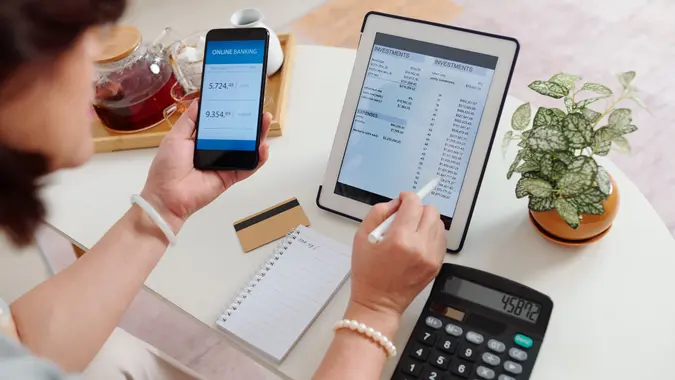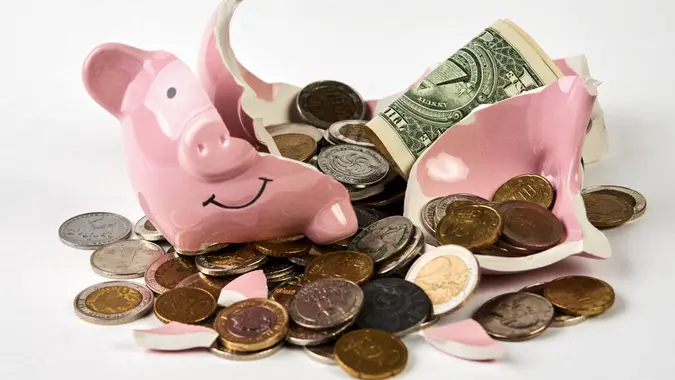Do Banks Verify Signatures on Checks?

Commitment to Our Readers
GOBankingRates' editorial team is committed to bringing you unbiased reviews and information. We use data-driven methodologies to evaluate financial products and services - our reviews and ratings are not influenced by advertisers. You can read more about our editorial guidelines and our products and services review methodology.

20 Years
Helping You Live Richer

Reviewed
by Experts

Trusted by
Millions of Readers
The traditional practice of writing checks continues to be a key element in personal and business finance, despite the growing prevalence of digital transactions. A frequently overlooked but vital part of check writing is the signature. This raises a critical question: Do banks verify signatures on checks? Knowing the answer is crucial, particularly for those learning how to write a check correctly.
Do Banks Verify Signatures on Checks?
Yes, banks typically verify signatures on checks, but the process and rigor of verification can vary. The signature on a check is a fundamental component that banks use to authenticate the transaction. It serves as a security measure to prevent fraud and unauthorized access to your funds. When you open a bank account and provide your signature, the bank maintains a copy of it for future reference.
The Verification Process
The process of verifying signatures on checks involves different methods, depending on the bank’s policies and the specific circumstances of each check. Here’s a look at how it works:
- Automated verification: Some banks use automated systems to compare the signature on a check with the signature they have on file. These systems are efficient but not foolproof, as they might not catch every discrepancy.
- Manual verification: In cases of large transactions or if a check raises suspicion, bank employees may manually compare the signatures. This process is more thorough but less common for smaller, routine checks.
- Discrepancies and fraud prevention: If a bank detects a significant mismatch in the signature or other potential signs of fraud, it may refuse to process the check. The bank might also contact the account holder for verification.
Why Signature Verification Matters
Signature verification acts as a primary defense against check fraud, aiding in the prevention of unauthorized transactions. Additionally, banks have a legal obligation to authenticate the transactions they process, making signature verification not just a security measure but also a compliance requirement.
Writing Checks Safely
Knowing how to write a check correctly is essential for ensuring that your transactions are secure and honored by the bank. Here are some tips:
- Consistent signature: Keep your signature consistent with the one the bank has on file.
- Clear details: Write legibly and include all necessary details like the date, payee’s name and amount.
- Secure handling: Store your checks securely and don’t leave signed checks unattended.
Final Take
While banks do verify signatures on checks, the methods and thoroughness can vary. As a check writer, ensuring your signature is consistent and familiarizing yourself with how to write a check properly are key steps in safeguarding your financial transactions. Always be mindful of the security aspects surrounding check writing to prevent fraud and maintain the integrity of your transactions.
FAQ
Here are the answers to some of the most frequently asked questions about check verification.- Are banks required to verify signatures on checks?
- Yes, banks are required to verify signatures on checks. This is part of their due diligence and legal compliance to prevent fraud and unauthorized transactions.
- How are signatures verified in banks?
- Signatures are verified in banks either through automated systems that compare the check signature with the one on file or through manual inspection by bank personnel, especially for high-value or suspicious checks.
- What happens if your signature doesn't match in bank?
- If your signature on a check doesn't match the one the bank has on file, the bank may refuse to process the transaction. They might also contact the account holder to confirm the authenticity of the check.
- How do banks verify checks?
- Banks verify checks by checking the signature against the one on file, ensuring the check has all necessary information -- like date, amount and payee -- and sometimes confirming the account holder's identity and account balance. For larger transactions, additional verification steps may be involved.
Editor's note: This article was produced via automated technology and then fine-tuned and verified for accuracy by a member of GOBankingRates' editorial team.
 Written by
Written by 

























